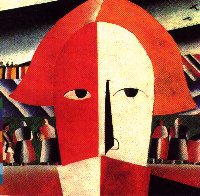I wrote this page in memory of our friend Dmitry Pokrovsky, who died at the age of 52 in Moscow, June 19, 1996.
| Back to the russian page | Theatre-Academy Interstudio |
|
The stalinistic agricultural politics destroyed the old traditions and the way of living in the villages and by this, killed the music, too. It was replaced by the 'Balalaika-' and 'Kasatchok'-ensembles, which pretended to perform the people's culture what had never been the people's culture.
|
There were only few occasions to perform in Breshnew times and only since Perestroijka tours and concerts in greater halls became possible. He got the Gorbatchew Award for his merits caring for the russian culture. Pokrovsky lived in the United States for some years, but he came back to Russia regularly. |
 |
Dmitry Pokrovsky taught at the Academy INTERSTUDIO in Puschkin and he participated in the KUKART I Festival in 1993 with his ensemble.
|
In Autumn 93, I was lucky to witness his first public concert in Russia after more than 5 years, in the Moscow Tchaykovsky Hall. After 2 sets, the ensemble left the stage and danced to the foyer, together with the audience. After the concert, the people couldn't stop to sing and dance, walking down the long escalators to the Metro Station.
I found a letter in a book, released in 1984, which described one of their early, nearly private concerts:
.. to a concert in a new concert hall in a newly constructed area in the southwest of Moscow (long way to go by metro). My old girl friends from University came, too. It was an extraordinary event, we hadn't heard and seen something like this for a long time, maybe never before.
A folklore ensemble performed, young musicians, singer and dancers, who travel around the whole country and collect old russian songs: ritual songs, joke songs, dances; they don't stilyze it, they keep them in the original, traditional way.
The concert finished in a very quaint way (for our understandig, as we are not used to spontanous, public performances): the singer and the dancers jumped from the stage, whirled through the hall and drew the audience with them (...) to the foyer, where they started a round dance, animating more and more people to join them; at least everybody danced. Even I, in my age, nearly joined dance. It is said that in summer time the group dances and sings on the street. In our region, this is very extraordinary (in the cities, not in the country side).
from: "Nadja, Briefe aus Rußland." Translated, and edited by Natascha Wodin, Nishen Verlag Kreuzberg 1984.
|
Gesichter Rußlands - Faces of Russia Trikont, München 1991 |
Girls are walking |
The Wild Field
Real World Records, 1991
Les Noces - The Wedding (Igor Strawinsky)
and Russian Village Songs
Elektra Nonesuch, 1994
I want to contribute some comments to the last named CD, which I wrote for the magazine 'JazzThetik' in 1994:
Igor Strawinsky based his work on the folk music and was fascinated by new technologies, tried to create mechanic music. Dmitry Pokrovsky studied music and composition and then turned to the folk music.
70 years after the publication of Strawinsky's ballet music LES NOCES, written in France, the moscovitan Ensemble Dmitry Pokrovsky now releases a breath-taking version.
Strawinsky had to content himself with 4, percussiv-like played forte pianos, because he couldn't synchronize the mechanical instruments with the acoustic instruments; nowadays Pokrovsky takes advantage from the computer and by this he finds the long wished precision.
But even more interesting is how Pokrovski 'repatriates' the emigrant Strawinsky posthum. For many years now, he researches, together with his ensemble, the nearly lost, because repressed russian folk music and he interpretes it with masterly technique, breath-taking tempo and splendour.
And now he integrates Strawinsky's music into a collection of russian wedding songs; no classic vibrato and melting sounds, voices sharp as knifes... the ensemble rescues LES NOCES from european stage dust.
That's what Strawinsky intended.
This page was uploaded November 14, 1996. You can reach me, Cornelie Müller-Gödecke,
at the following adress:  cmg@avantart.com
cmg@avantart.com